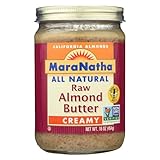Are you seeking a healthy and tasty meal that is also simple to prepare? Raw almond butter can also be the solution if you are searching for a nutritious as well as satisfying craving.
So, Let’s start.
Page Contents
What is Raw Almond Butter?
Nut butter like raw almond butter is created from raw almonds that haven’t been cooked or roasted. The almonds are processed into a smooth or chunky paste with a nuttier taste and texture than peanut butter. Because it doesn’t have any added sugar, salt, or preservatives. Raw almond butter is sometimes seen as a better substitute for conventional peanut butter.
It is a popular option for those following low-carb or plant-based diets since it is a good source of protein, fiber, healthy fats, and a variety of vitamins and minerals. It may be incorporated into smoothies, or spread over toast. Also used as a dipping sauce for fruits and vegetables.
Benefits of Raw Almond Butter
There are various possible health advantages of raw almond butter, including:
- High in heart-healthy monounsaturated and polyunsaturated fats, which have been found to help lower cholesterol levels, almonds are a rich source of these fats
- High in protein: Almond butter is an excellent source of plant-based protein that can help you feel content and full for extended periods of time
- Reduces the risk of chronic diseases: Rich in antioxidants, raw almond butter can assist the body to reduce inflammation and the risk of chronic illnesses including cancer and heart disease
- Almonds are an excellent source of calcium, magnesium, and phosphorus, all of which are necessary for strong bones and teeth
- Almonds have a low glycemic index, which implies that blood sugar spikes are less likely to occur as a result of eating them. Because of this, almond butter is a wise choice for those who have diabetes or want to control their blood sugar
- Helps in digestion: Fiber-rich raw almond butter can support a healthy digestive system and regular bowel motions
Therefore, adding raw almond butter to your diet may be a delicious and nutritious approach to increasing your intake of nutrients and promoting overall health and wellness. Although it is heavy in calories like all nut butter, it is nevertheless necessary to use it in moderation as part of a healthy diet.

Side Effects of Raw Almond Butter
When ingested in moderation, raw almond butter is often regarded as safe for the majority of individuals. Yet there are some possible negative consequences to be aware of, such as:
- Allergies: Those who are sensitive to tree nuts may experience an adverse reaction to almond butter. The signs of an allergic response might be modest or severe (such as difficulty breathing and anaphylaxis)
- Weight gain: Almond butter contains a lot of calories and fat. Eating a lot of it might make you gain weight if you don’t balance it out with a healthy diet and regular exercise
- Abdominal pain: Consuming excessive amounts of almond butter might result in digestive discomfort including bloating, gas, and diarrhea
- Almonds include oxalates, which can help some individuals develop kidney stones. Oxalates are also present in many other plant-based meals. For those who are predisposed to kidney stones, this is an uncommon occurrence and only causes anxiety
- Pesticides: Pesticide residues that are present in non-organic almond butter may have a negative long-term impact on health
Generally, the negative effects of eating raw almond butter are usually minor and may be avoided by eating it in moderation and, where possible, sticking to high-quality, organic goods. It is always recommended to speak with a medical expert before making any substantial dietary changes. If you have any questions regarding the safety or usefulness of almond butter for your particular health needs.
Details About Raw Almond Butter
The following astounding details regarding raw almond butter:
- The major component of almond butter, almonds, are really seeds from the almond tree rather than nuts
- As they have been grown for so long, experts think that the Middle East is where almond cultivation first began
- Vitamin E, which is essential for maintaining a strong immune system, healthy skin, and eyes can all be found in plenty in almonds
- For those who are allergic to peanuts, almond butter is a fantastic substitute for peanut butter
- One tablespoon of almond butter contains around 7% of the daily required amount of calcium, making it a rich source of the mineral
- Tryptophan, an amino acid found in almonds and almond butter, aids in the body’s production of serotonin, a neurotransmitter that controls mood and sleep
- Smoothies, sweets, savory sauces, and dressings may all be made using almond butter, making it a versatile ingredient
- Making raw almond butter at home is as easy as processing raw almonds in a food processor or blender until they are completely smooth
- Almond butter has a lengthy shelf life and may be kept in the refrigerator for even longer periods of time than at room temperature
- A nutrient-rich meal like raw almond butter can improve heart health, aid with digestion, and help with weight control, among other health advantages
Recipe to Make Raw Almond Butter
Here is a simple recipe for making raw almond butter at home:
Ingredients
- 2 cups raw almonds
- 1/4 tsp sea salt (optional)
Instructions
- Spread the raw almonds out in a single layer on a baking sheet, and roast them for 10 to 15 minutes at 350°F (180°C), or until they are aromatic and faintly yellow. Although roasting the almonds is optional, it will bring out their natural oils and improve their flavor
- After letting the roasted almonds cool for a little while, add them to a high-speed blender or food processor
- The almonds should be pulsed for a couple of minutes, or until they are crushed into a coarse meal
- After mixing the almonds for an additional 5 to 10 minutes, or until they have developed into smooth and creamy nut butter, use a spatula to clean the inside of the food processor or blender. According to the power of your blender, this may require some patience
- The almond butter should be pulsed a couple more times to include the sea salt (if using)
- For up to a few weeks, keep the almond butter in the refrigerator or at room temperature in a clean jar or another airtight container
Note: You may pulse the almonds less and leave some little pieces intact if you want chunky almond butter. Also, you may alter the flavor by using extra ingredients like honey, cinnamon, or vanilla extract.
We have another recipe The Best Almond Butter Keto Recipe For You related to this.
How to Store Raw Almond Butter
To keep raw almond butter as fresh as possible, put it in the refrigerator in an airtight container. This will lessen the likelihood of oxidation and rancidity, which might hasten the spoilage of the almond butter.
Make sure to properly whisk the almond butter to disperse any isolated oils before storing it. Also, it will guarantee that the butter stays creamy and smooth.
You may also keep the almond butter at room temperature if you intend to use it within a week or two. But, bear in mind that if it isn’t refrigerated, it can start to go bad more rapidly.
Nutritional Values
According to the brand and the particular recipe, raw almond butter’s nutritional information might change, however, the following basic breakdown is provided per 2 tablespoons (32g):
- 190 calories
- 18g total fat
- 1.5g of saturated fat
- 0g of trans fat
- 0 mg of cholesterol
- NaCl: 0 mg
- 6g of total carbohydrates
- 3g of dietary fiber
- 1g sugars
- 6g protein
Protein, fiber, and beneficial fats may all be found in almond butter. Magnesium, potassium, and vitamin E are all abundant in them. Almond butter should, though, be taken in moderation as part of a balanced diet because it is also heavy in calories.
Conclusion
Raw almond butter is a nourishing and tasty snack that has a variety of health advantages. It is high in fiber, protein, and vital minerals like vitamin E, potassium, and sodium. Almond butter may be a healthy complement to a balanced meal, but because of its substantial number of calories, it should be used in moderation.

To prevent lipid oxidation and spoiling, store raw almond butter in an air-tight container in a refrigerator.
More related articles,
- Are Udon Noodles Healthy and Best
- The Best Banana Oat Smoothie Recipe
- Carbs in White Onion: Is It Good For You
- Organic Cream Cheese And Its Best Recipes For You
FAQs
With 200 calories, nearly 19 grams of fat, and almost 5 grams of protein, almond butter can help you bridge the gap between meals when you’re hungry. It contains heart-healthy monounsaturated fats as well as vitamins and minerals, including vitamin E, magnesium, and calcium.
Raw nut butter products are made from pasteurized almonds, however, they do not go through the same heat treatments as roasted products. Roasted nut butter is baked or heated to produce a desired flavor and/or color prior to grinding.
It’s just pure organic almonds in a slightly crunchy, super spreadable form. Made on machinery that processes a variety of tree nuts and seeds, but does not process peanuts, gluten, dairy, or soy. Ingredient: Raw Organic Almonds. almond butter nut butter pure raw whole30.












